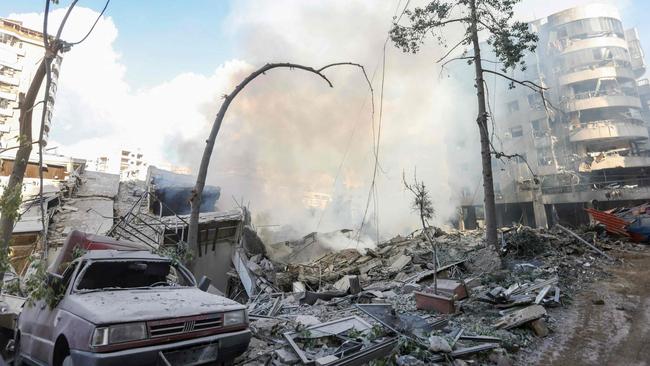
Judging on his statements about the war in the Middle East across the past year and the domestic turmoil and division it has unleashed, it’s glaringly obvious the war is not at the front of his mind and not where he is at either.
Our Prime Minister sounds as if he just wishes it would all go away and he could get on with whatever else his struggling first-term government might stand for.
The problem starts with language. Instead of clear words based on ethical and national interest foundations that lead to policy directions and decisions, our leader sounds a bit like Vladimir Putin, who also is unable to call a war a war.
Putin insists on his bizarre label of “special military operation” for his invasion of Ukraine. Albanese mutters about escalation and conflict when it comes to Israel’s existential war against Iran and its terrorist proxies.
Language matters because woolly language leads to woolly thinking. When asked on ABC radio whether what we were seeing was a regional war, he at least agreed but went on with what we’d heard from him about the war during the past year: waffle.
“I don’t want to get into a definitional argument,” Albanese said. “What you have is a tragedy. There was the terrorist actions, of course, almost a year ago now, of Hamas on October 7 … Then we’ve seen too many innocent civilians lose their life, whether they be Israelis, Palestinians or Lebanese.”
The Prime Minister talked about Iran’s latest mass missile attack against Israel, saying: “It’s an escalation of the conflict that we keep see occurring. We condemn Iran’s actions in lobbing missiles into Israel … along with the United States, the UK, Canada, EU, France, Germany, Italy, Japan, Saudi Arabia, UAE and Qatar, we signed a declaration calling for a de-escalation, calling for an immediate ceasefire.”
What is going on here? It’s great that he appears to remember a briefing note about there being a Hamas terrorist attack against Israel in October last year, but do we really want to hear our Prime Minister talking about Iran “lobbing missiles” into Israel? Is listing a set of countries supposed to substitute for thinking and insight?
Where is Hezbollah in this picture? Does Albanese know that Hamas and Hezbollah have been lobbing missiles, rockets, drones, mortars and antitank weapons into Israel most days since October 7 last year because they are in an active, hot war with Israel? And does he know that Hezbollah’s terrorist fighters were poised to conduct a similar murderous rampage into northern Israel before being disrupted by Israel?
Whatever you think of the Israeli government of Benjamin Netanyahu and his extremist right-wing coalition members, and of armed Israeli settlers on the West Bank, it’s an unfortunate fact that Israel is fighting an existential war against Iran and Iran’s terrorist proxies Hamas and Hezbollah, with others in Syria and Yemen’s Iranian-equipped Houthis.
This bottom line is why US President Joe Biden keeps supporting Israel during this war as he did in reacting to the Hezbollah leader’s recent death, saying: “Hassan Nasrallah’s … death from an Israeli air strike is a measure of justice for his many victims. The United States fully supports Israel’s right to defend itself against Hezbollah, Hamas, the Houthis, and any other Iranian-supported terrorist groups.”

Why isn’t it possible for Albanese to say similarly simple things, such as Australia supports Israel destroying Hezbollah bases, weapons and fighters in southern Lebanon to let displaced Israelis return to their homes? Or that it is against the law to openly support terrorist organisations in Australia?
Instead we get vague lectures to the Israeli government mid-war such as the one Foreign Minister Penny Wong delivered at the UN, including this: “War has rules. Every country in this room must abide by them. Even when confronting terrorists.”
That’s a wonderful sound bite for every pro-Hamas and pro-Hezbollah person to hear, but Wong’s appointed inquisitor into Israeli military actions in Gaza found the Israelis used the same rules as our military.
With one critical difference: the Israelis hold their officers to account quickly when they break those rules, dismissing and demoting senior officers within days, instead of our decades-long process against junior personnel over alleged Afghan war crimes. That report appears to have not affected Wong’s understanding of events, perhaps because it said things she didn’t want to hear.
Collective defence is the core of Australian defence strategy and the foundation for our security. Yet, when two fellow democracies – Ukraine and Israel – are under attack and at war, we find our government without the words, let alone the actions, to stand up and help our partners. Though we expect others to come to our aid, should we be involved in war here in our own region. Maybe it’s not too late for Albanese to do what effective leaders must in times of danger and anxiety: lead through words and decisions based on ethics connected to national interests and reality. That would mean understanding what is at stake, not just for Israel and its 9.4 million people as they fight an existential war.
It also would mean understanding what his woolly language on Australians actively supporting Hezbollah and Hamas here at home is leading to: police seemingly reluctant to enforce our laws and emboldened terrorist supporters in our communities.
And it would mean getting away from viewing the war as some issue to be managed for narrow political advantage back here in particular pro or anti-Israel electorates instead doing what is right, even if it’s politically hard.
Michael Shoebridge is the director of Strategic Analysis Australia.






Anthony Albanese gave what was probably an unwitting insight into his thinking on the war in the Middle East when he said “overwhelmingly, it’s not front of mind of where Australians are at”.